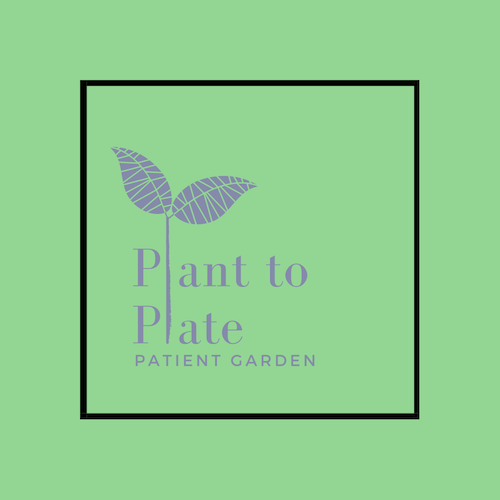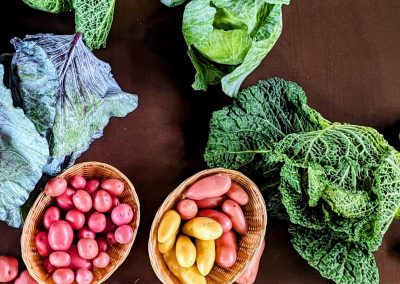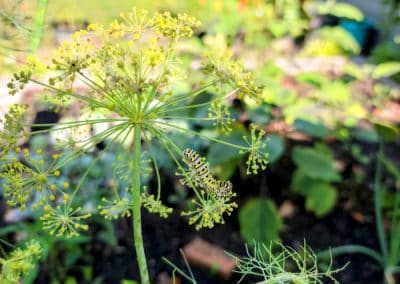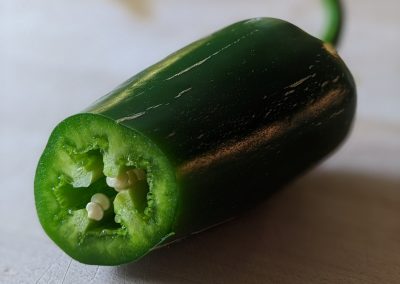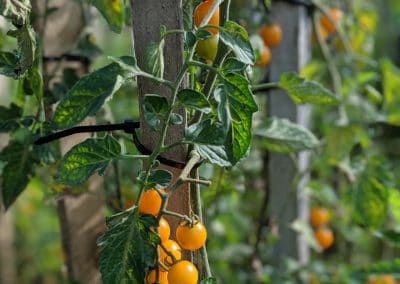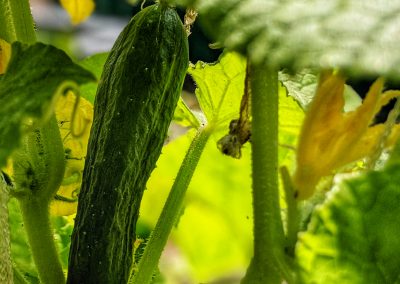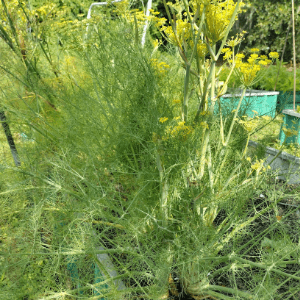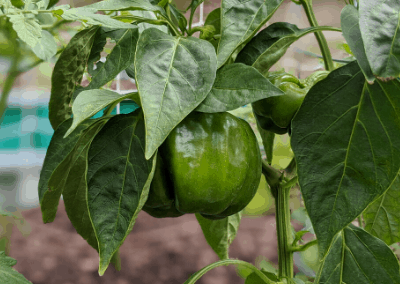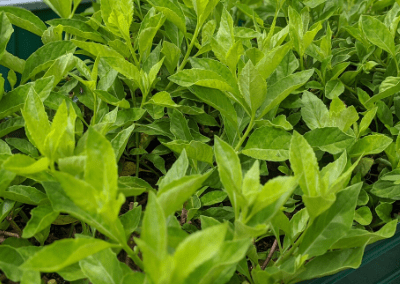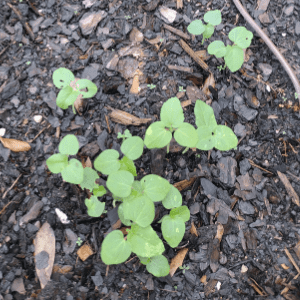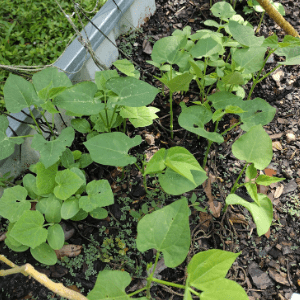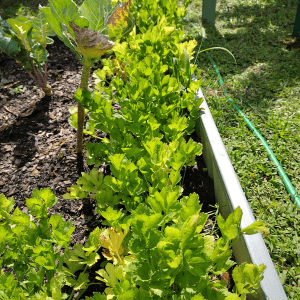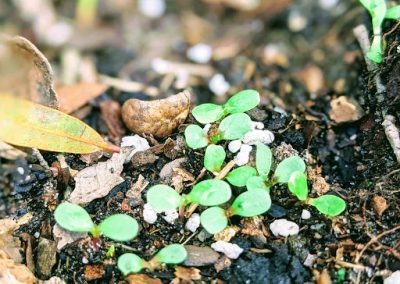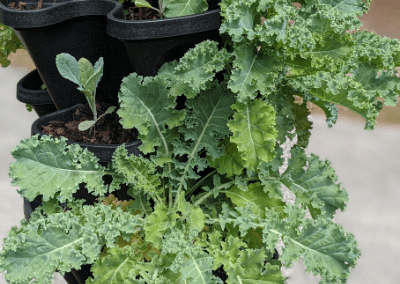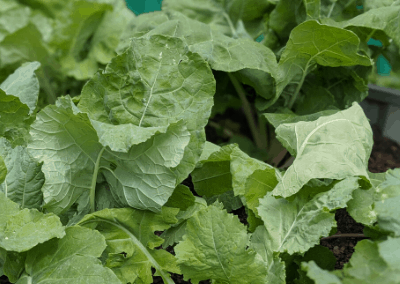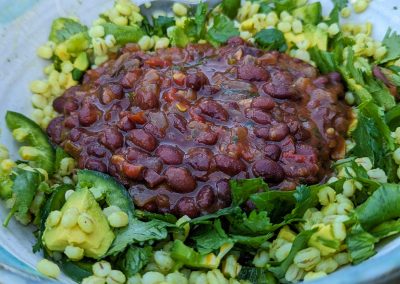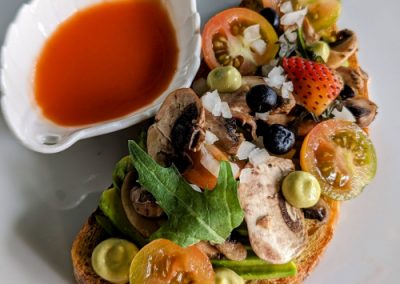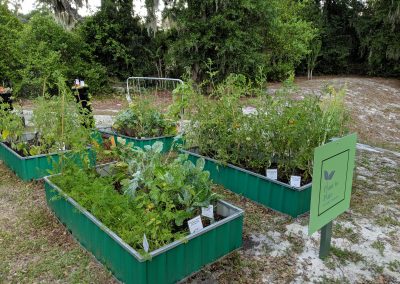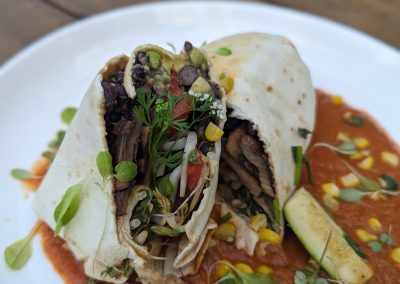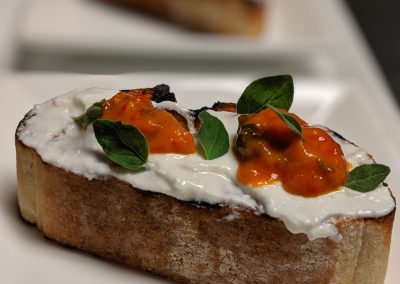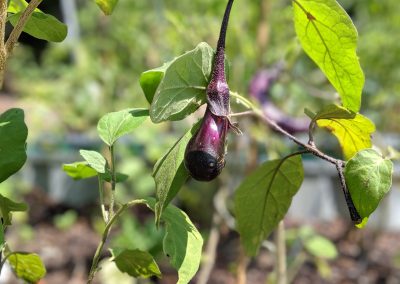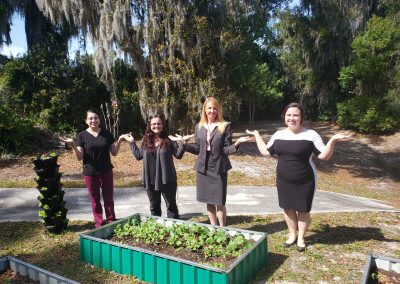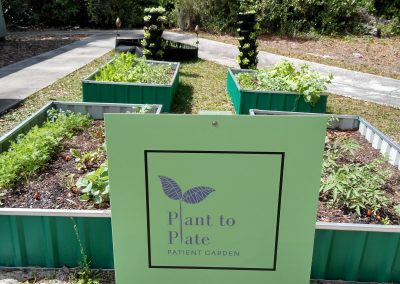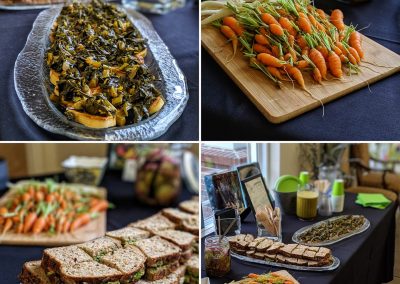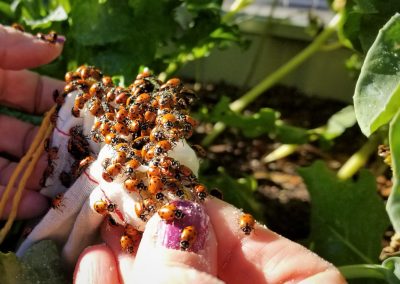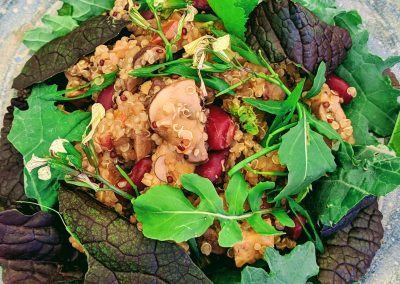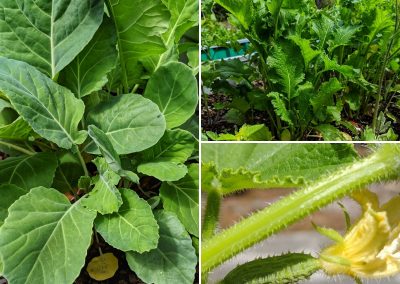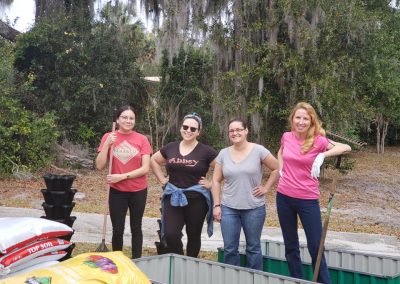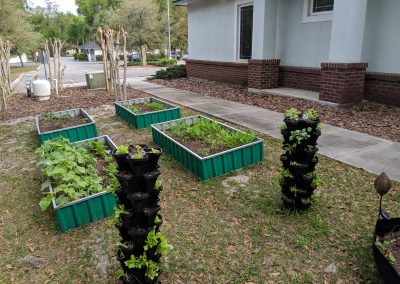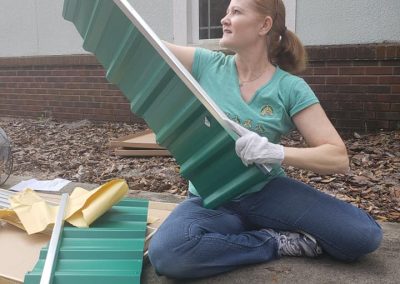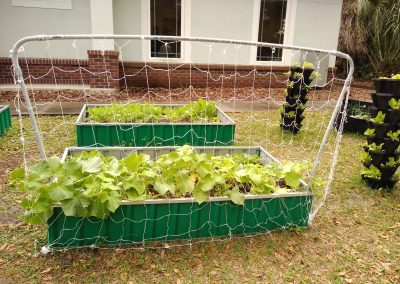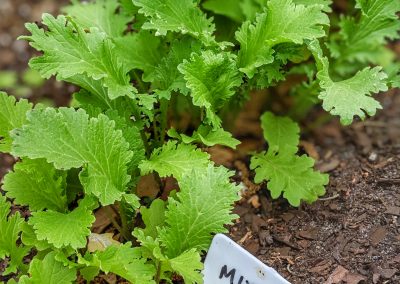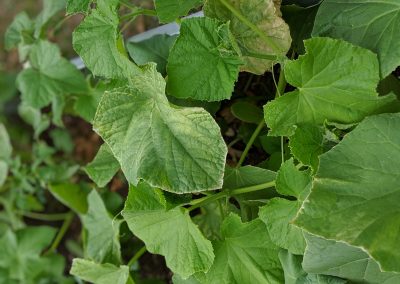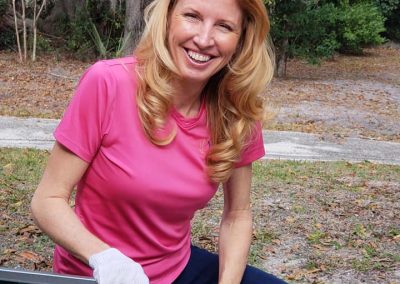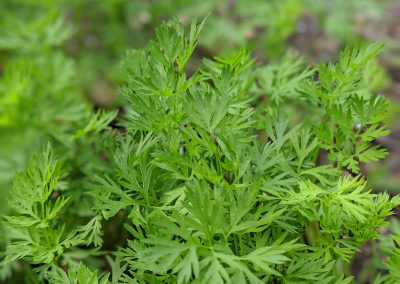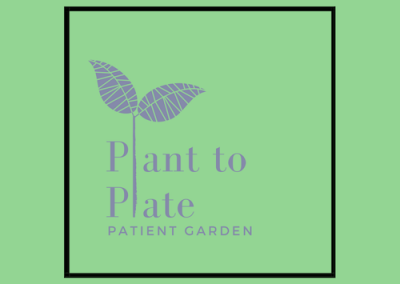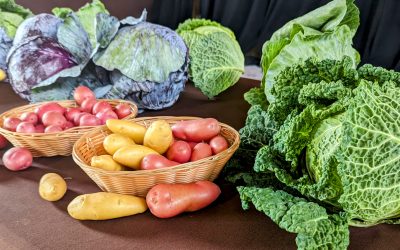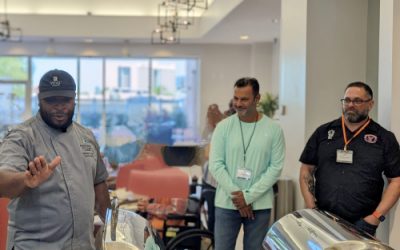Plant to Plate
Patient Garden
Healthy | Affordable | Accessible
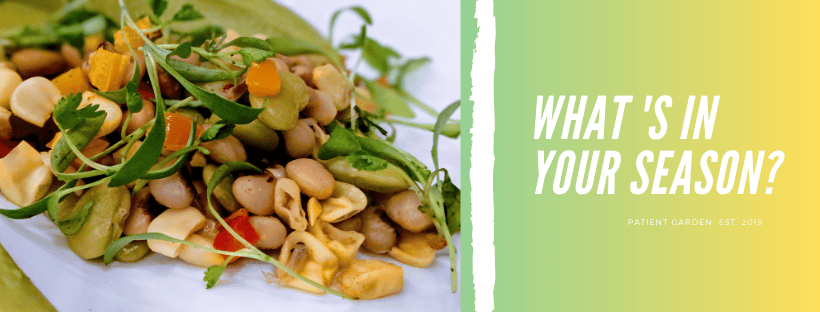
“The *feast or famine* situation is especially a problem for low-income parents, particularly mothers, who often restrict their food intake and sacrifice their own nutrition in order to protect their children from hunger.”
“When available, healthy food may be more expensive in terms of the monetary cost as well as (for perishable items) the potential for waste, whereas refined grains, added sugars, and fats are generally inexpensive, palatable, and readily available in low-income communities.”
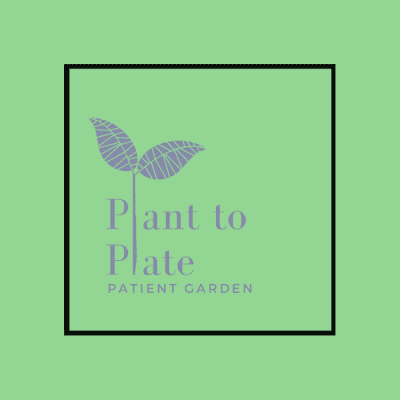
Having Trouble Finding a Nutritious Balance?
ONLY 9.3% of adults meet the daily vegetable intake recommendation.
Seven of the “Ten Leading Causes of Death” are linked to poor nutrition, according to the CDC. Part of the answer to a healthy life lies in vegetable gardens. Community gardens can reduce barriers to healthy food associated with transportation, cost, and food preference and may increase food security. Diabetic patients, who participated in a community garden had a significant reduction in their HgA1c. Several individuals reported that the gardening efforts contributed to a sense of togetherness within the family or as a place to spend quality family time building relationships. Community gardening activities were an excellent way to pass the time, and bring relaxation, enjoyment, or reduce stress.
We Are Here to Help You Eat Healthy on Any Budget
Patients want and need healthy, affordable, accessible options for fresh vegetables and fruits. They are looking for ways to improve and control their diabetes, hypertension, vascular disease, colon disorders, cancers, renal disease etc. Thankfully, there are simple ways to help unhealthy patients who have said they often choose less healthy options because of cost.They can participate in the local RX: Veggies & Fruits Program or drop by our garden to pick what you need.
Why now? Because the food we eat and how we produce it will determine the health of people and planet, and major changes must be made to avoid both reduced life expectancy and continued environmental degradation.
What is Trying to grow in Spring 2024
Plant to Plate has been a struggle. We are replanting June 1 — wish us luck. On the most recent evaluation, the well water is too acidic. Which is why ONLY FENNEL LIVES. So, we are going to attempt to counter the drama and create a thriving garden again
Here is what might be available:
- REDOING towers – hopefully
- Heirloom Purple Okra- June 2024
- Green peppers
- Longevity spinach – in it’s own bed
- Tomatoes
- Fennel – still there
- Eggplant
- Radishes
- Cabbage
- Jalapeno Pepper
- Habanero Pepper
- Lemongrass
- Onions-bunching
- Dwarf Banana plants-growing
- Surviving Blueberry bush (and one recovering)
Previous and current seasons
Patient Garden Recipes
Choosing and working with the right ingredients isn’t hard, but it does require a little know-how and planning. Here’s everything you need to know about cooking seasonally from the Plant to Plate Patient Garden.
RECIPES 2022, 2021, 2020 & 2019
- Carrots & Turnip Stew 2019
- Braised Greens 2019
- Collards Slaw 2019
- Core Value Chutney 2019
- Power Bowl – Portfolio Diet 2019
- Core Value Chutney 2019
- Watermelon & Heirloom Tomato 2019
- Tunisian Lentil Soup 2020
- Roasted Root Veggie with Roasted Garlic and Lemon Dressing 2020
- Lentil-Rice Dosa 2021
- Independence Day Salad 2024

Healthy Meals and Tips
Check out our tips & seasonal recipes for West Volusia produce and fruits, during their growing season. Dr. Jim’s Home Garden helps us plan and maintain our garden at the office. What started out as a hobby for him has become an integrated lifestyle choice. The terms local and sustainable are a part of his eating habits and gardening philosophy. His diet has become more vegetarian & diverse; as a result he feels healthier.

One way to help is by building a free community garden for patients,
like the one right here at DeLand Foot and Leg Center – Plant to Plate Patient Garden. Here patients can access food and learn new ways to prepare them. For every 4×4 raised bed another practitioner starts = 125 pounds of vegetables in our community. GOT DIRT? WE HAVE A SOLUTION. Let us help.
Our Approach
Part of the answer to a healthy life lies in vegetable gardens. Community gardens can reduce barriers to healthy food associated with transportation, cost, and food preference and may increase food security. Diabetic patients, who participated in a community garden had a significant reduction in their HgA1c. Several individuals reported that the gardening efforts contributed to a sense of togetherness within the family or as a place to spend quality family time building relationships. Community gardening activities were an excellent way to pass the time, and bring relaxation, enjoyment, or reduce stress.
Why Now?
” Current dietary trends, combined with projected population growth to about 10 billion by 2050, will exacerbate risks to people and planet. The global burden of non-communicable diseases is predicted to worsen, and the effects of food production on greenhouse-gas emissions, nitrogen and phosphorus pollution, biodiversity loss, and water and land use will reduce the stability of the Earth system.”
Food Insecurity Framework
” Low-income neighborhoods frequently lack full-service grocery stores and ‘farmers markets’ where residents can buy a variety of high-quality fruits, vegetables, whole grains, and low-fat dairy products. Instead, residents – especially those without reliable transportation – may be limited to shopping at small neighborhood convenience and corner stores, where fresh produce and low-fat items are limited, if available at all. “
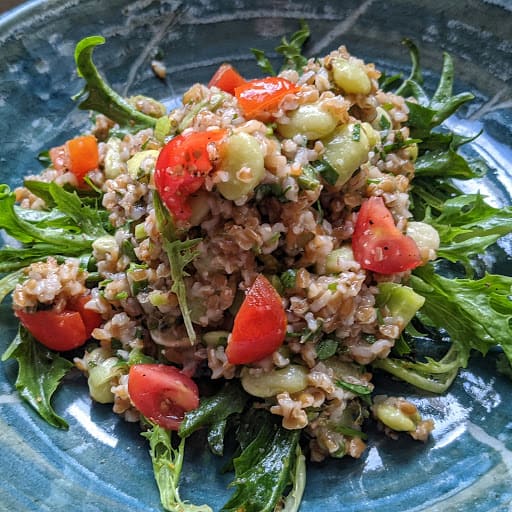
Finding a Balance Can Be Hard, but Eating Healthy Doesn’t Have To Be
The most important benefit of following a plant-based diet, aside for weight loss, is that it decreases the risk of heart disease, high blood pressure, high cholesterol, diabetes, dementia, certain cancers, and even death. Learn more from the booklet that is a straightforward, plant-based approach that delivers lasting benefits far beyond the scale. BY MICHELLE McMACKEN, MD
About Dr. Pulapaka
“I believe every patient needs a physician who will be an advocate to help them regain their health”.
Dr. Jenneffer Pulapaka’s expertise in podiatric surgery has helped thousands of patients. She opened her practice in 2005, DeLand Foot and Leg Center (DFALC), where she currently sees patients. DFALC was the first female podiatric surgeon’s office in a community where less than 10% of the surgeons were women. It is the first and longest-running female surgical practice in West Volusia County. “I believe every patient needs a physician who will be an advocate to help them regain their health”. Her surgical training has taken her to Miami for her residency and the Ilizarov Institute, in Russia, for her fellowship. She was the first certified Women-Owned medical practice in the United States and has a podcast show, Podiatry DocTalk.
For the last 4 years, I have been advocating for healthy food for my patients and children. A universally healthy diet largely consists of vegetables, fruits, whole grains, legumes, nuts, and unsaturated oils, includes a low to moderate amount of seafood and poultry, and includes no or a low quantity of red meat, processed meat, added sugar, refined grains, and starchy vegetables. A community vegetable garden provides healings resources through their food and activities; while being an excellent way to relax and enjoy the Earth. By applying the universal diet, the Lancet estimated that it could prevent about 23.6% of total premature deaths among adults. Quality Food Matters.

Food Blog
Subscribe for Healthy Eating & Cooking Resources Every Few Weeks
Plate Blog
BlogLatest from the Plate
Healthy Feet, Healthy Eats
Healthy Feet, Healthy Eats: The Podiatric Power of Lifestyle Medicine Inspired by the Hastings Florida Panel during the Cabbage, Potatoe, Bacon Festival in April 2024. Podiatry, often viewed through the narrow lens of foot and ankle disorders, plays a crucial...
Culinary Panel
The Intersection of Podiatry and Gastronomy: A Tale of Culinary Healing Welcome to a vibrant exploration of Podiatric Lifestyle Medicine and the Food as Medicine philosophy, with a spotlight on the extraordinary work of chefs and medical professionals who craft...
Get in Touch!
“More than 820 million people have insufficient food and many more consume low-quality diets” that will pose a greater risk to morbidity and mortality than does unsafe sex, and alcohol, drug, and tobacco use combined.”
Email Address
info@planttoplate.info
Call Us
(386) 222-2628
Visit Us
Garden Location:
844 N. Stone St, DeLand, FL 32720
